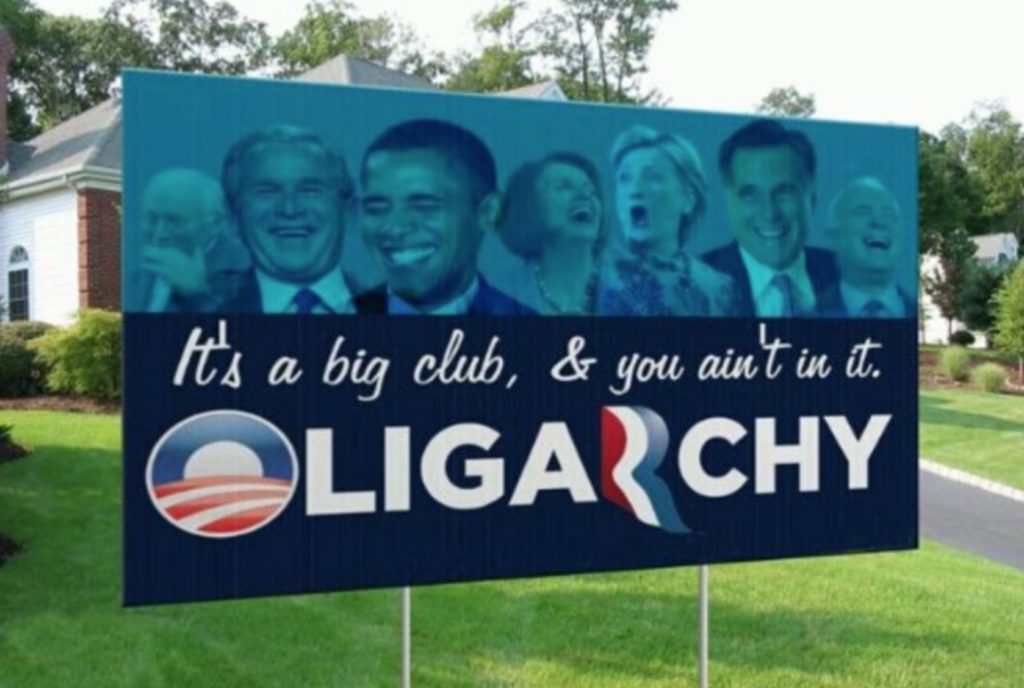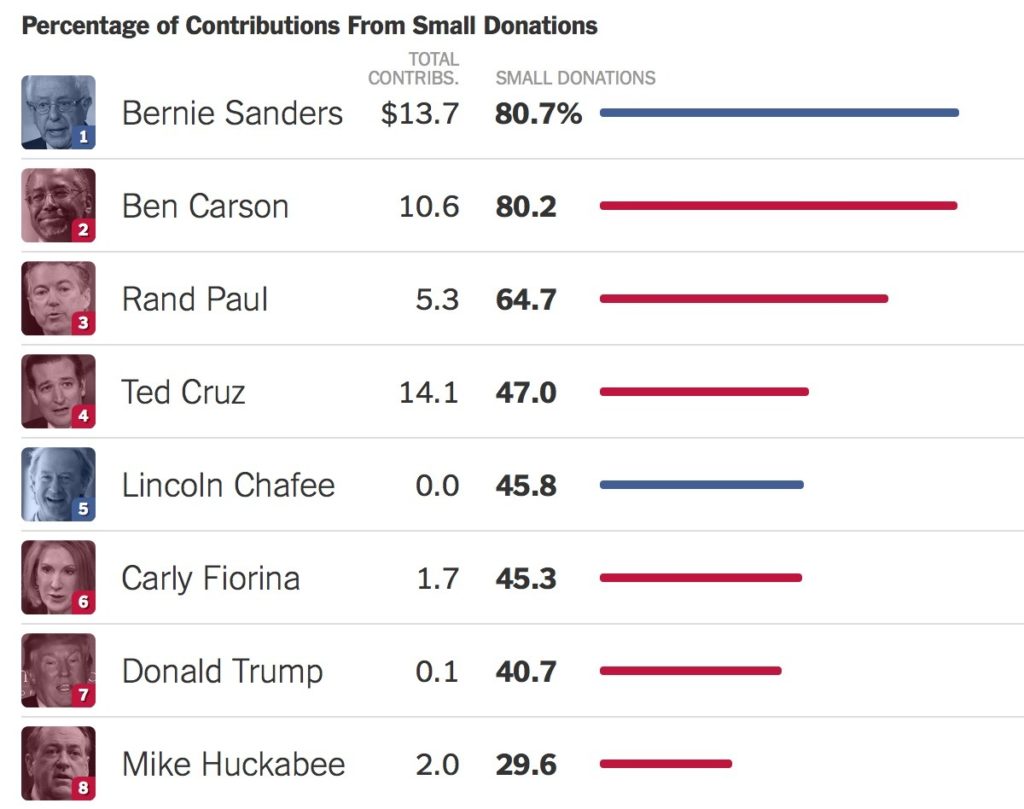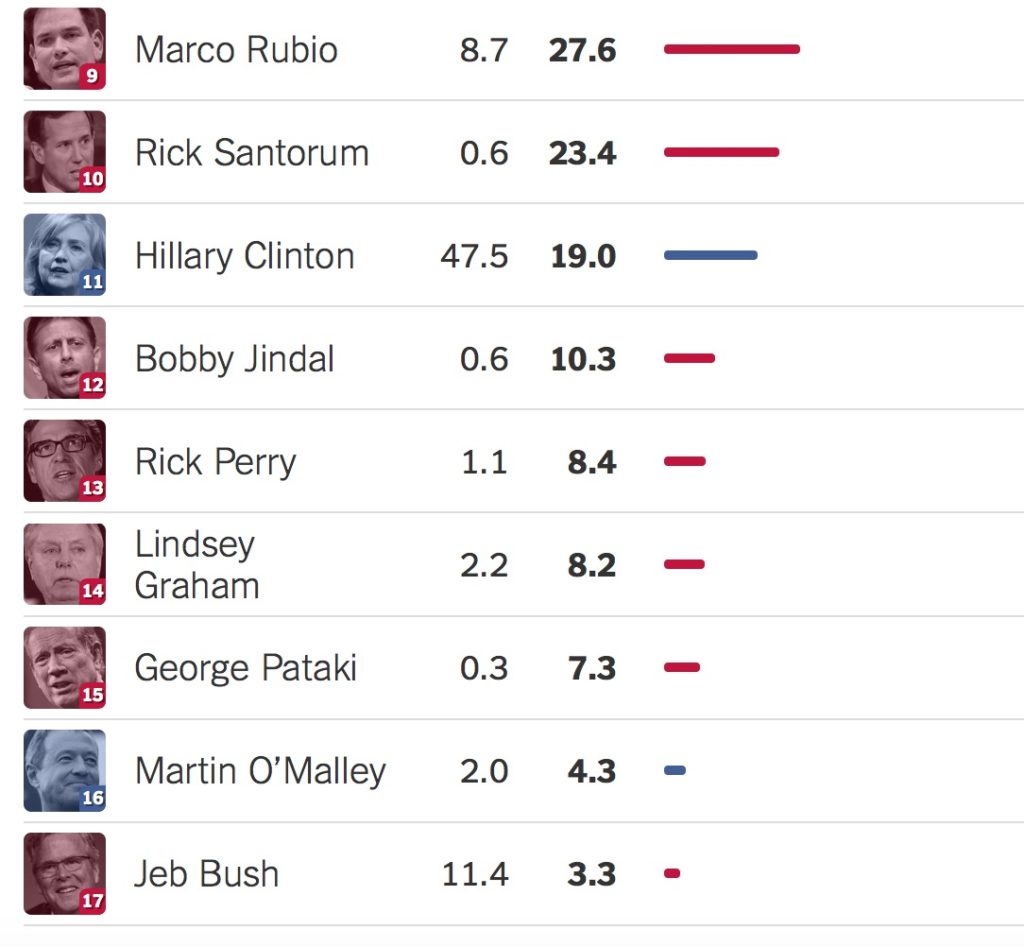
Yesterday represented the first deadline for many 2016 Presidential candidates to file Federal Election Commission details on how they are raising and spending campaign money. The information is very interesting and will leave you with little doubt as to which puppets, I mean candidates, the oligarchs are supporting.
One metric that is getting a great deal of attention today, is the percentage of funds raised coming from small donors ($200 or less). The New York Times put together a user-friendly image of this data, which can be seen below:


As you can see, despite an extremely crowded field, Jeb Bush was still able to come in dead last amongst small donors (i.e., your typical American citizen). This should come as no surprise to anyone, as I’ve repeatedly noted on Liberty Blitzkrieg, how Jeb has absolutely zero grass roots appeal. Recall the following posts:
Jeb Bush Forced to Bus Supporters From Washington D.C. to CPAC as Attendees Walk Out On Him
An Oligarch Dilemma – Recent Poll Shows 42% of Republican Primary Voters Couldn’t Support Jeb Bush
Think the 3% figure is bad? The National Journal added the following tidbit:
When the $103 million his super PAC has raised is factored in, Bush’s fundraising from small donors is almost surely less than the 3 percent he reported for the campaign itself on Wednesday, and likely well below 1 percent. The super PAC said last week that it had a total of 9,900 donors—which would mean its average donor contributed more than $10,000. The super PAC said roughly 500 of its donors gave $25,000 or more.
The new report does show Bush’s tremendous appeal among the moneyed class of donors. In a remarkable static, the most common denomination for a donor to Bush was the legal maximum of $2,700. More than 3,400 donors gave Bush a maximum-sized contribution.
Moving along, the Wall Street Journal provided some additional insight into just who some of Jeb’s wealthy donors are:
Republican former Florida Gov. Jeb Bush’s first 15 days as a presidential candidate show Wall Street’s heavy hand, with nearly $145,000 in campaign contributions coming from employees at Goldman Sachs and nearly $114,000 from four other big banks.
Another large batch of contributions totaling $63,100 came from employees of the financial firm Neuberger Berman, run by his cousin George Herbert Walker IV, who previously worked at Goldman Sachs, according to campaign financial disclosure reports released Wednesday.
I didn’t know Jeb’s cousin ran Neuberger. Did you?
During his six years as an adviser for the defunct Wall Street bank Lehman Bros. and later at Barclays PLC, Mr. Bush said he earned, on average, between $1.3 million and $2 million. Employees of Barclays have donated $29,700 so far.
Mr. Bush also filed a form disclosing lobbyists who have bundled at least $17,600. The top bundler was William Killmer of the Mortgage Bankers Association, who collected $36,200, followed by Dirk Van Dongen of the National Association of Wholesale Contributors, who collected $33,900.
Not surprisingly, the former two-term governor of Florida received the biggest chunk of money from his home state: $2.56 million. New York came in second place with $1.27 million. Texas, home to his brother, former President George W. Bush, and his father, George H.W. Bush, contributed $1.18 million.
You can pretty much replace “New York” with “Financial Services Industry.”
So that’s the story with Jeb. What about the pantsuit revolutionary herself, Hillary Rodham Clinton? When it comes to small donors, she faired better than Jeb, but not by much, with only 19% of her donations coming from that demographic. Mother Jones added some useful color to the data:
Hillary Clinton hauled in $47.5 million in the first three months of her campaign, besting both Republican Jeb Bush, who raised $11.4 million, and her surprising Democratic challenger, Bernie Sanders, who racked up $15.2 million. According to her campaign, she had more than 250,000 donors, of whom 61 percent were female, an unprecedented number of female donors. But what Clinton did not highlight was that she had relied on wealthy donors and lobbyists to pull together most of her money.
Clinton reported raising $8 million—or 16.8 percent of her total—from small donors who gave $200 or less. Many politicians raise far less from small donors. Jeb Bush, for example, raised just 3 percent of his campaign cash from small donors. But Sanders blew Clinton out of the water when it came to grassroots fundraising, taking in $10.4 million (or 68 percent) of his warchest from $200-or-less donors.
The bulk of Clinton’s campaign funds came from an elite, wealthy class of donors—those who can afford to give the maximum donation. In 2014, roughly 0.04 percent of Americans made the maximum donation for a primary campaign of $2,600 (adjusted to $2,700 in this election cycle). Bush’s campaign raised more than 80 percent of its cash from this upper-crust of donors, and Clinton raised 64 percent. Clinton may well have had 250,000 donors—but just 11,400 of them accounted for almost two-thirds of her total fundraising.
Clinton also got a big boost from her bundlers—supporters who tap their personal and professional networks to amass donations for the campaign. Candidates are only required to list the names of registered lobbyists who have bundled for them, and Clinton did go above and beyond that by releasing on her website the names of 122 people who had raised $100,000 or more for her campaign. With much less fanfare, she also disclosed to the Federal Election Commission the names of 40 registered lobbyists who bundled just over $2 million for her campaign.
By comparison, Bush’s campaign listed the names of eight registered lobbyists who bundled $228,000 for his campaign. Sanders had no registered lobbyists fundraising on his behalf.
More interestingly, her favorability stats have been plunging, even amongst Democrats. We learn from the AP that:
WASHINGTON (AP) — Hillary Rodham Clinton’s standing is falling among Democrats, and voters view her as less decisive and inspiring than when she launched her presidential campaign just three months ago, according to a new Associated Press-GfK poll.
The survey offers a series of warning signs for the leading Democratic candidate. Most troubling, perhaps, for her prospects are questions about her compassion for average Americans, a quality that fueled President Barack Obama’s two White House victories.
Just 39 percent of all Americans have a favorable view of Clinton, compared to nearly half who say they have a negative opinion of her. That’s an eight-point increase in her unfavorable rating from an AP-GfK poll conducted at the end of April.
The drop in Clinton’s numbers extends into the Democratic Party. Seven in 10 Democrats gave Clinton positive marks, an 11-point drop from the April survey. Nearly a quarter of Democrats now say they see Clinton in an unfavorable light.
That’s pretty incredible.
While Clinton has spent decades in the public eye, she’s focused in recent months on creating a more relatable — and empathetic — image. In public events, she frequently talks about her new granddaughter, Charlotte, and references her early career as a legal advocate for impoverished children.
If you want to read more about the moment Hillary decided to forgo a career in public service in favor of chasing money and power, read: This is How Hillary Does Business – An Oil Company, Human Rights Abuses in Colombia and the Clinton Foundation (the relevant section is toward the end).
The survey suggests that voters aren’t sold on her reinvention: Only 4 in 10 voters say they view Clinton as “compassionate.” Just 3 in 10 said the word “honest” described her either very or somewhat well.
The percentage of respondents calling Clinton at least somewhat inspiring also slipped from 44 percent to 37 percent.
Clinton’s bad marks weren’t unique: Nearly all of the Republican candidates surveyed in the poll shared her underwater approval ratings. Former Florida Gov. Jeb Bush, a leading GOP candidate, saw his unfavorable ratings rise to 44 percent from 36 percent in April.
The fact that these establishment oligarch puppets are plunging in the polls is great news. People are finally starting to get the joke.
Meanwhile, how about that Bernie Sanders? He’s raised $15 million, 81% of which came from small donors and has no registered lobbyists. I disagree with Mr. Sanders on many issues, but you have to give this guy credit. He is running an ethical and grassroots campaign, and he’s succeeding. Others can and should learn from his example.
For related articles, see:
A Message to the Peasants – Jeb Bush Says Americans Need to Work Longer Hours
The 2014 Elections by the Numbers – Who are the 1% of 1% Driving American Politics?
Former Aide to Bill Clinton Speaks – “My Party Has Lost its Soul”
In Liberty,
Michael Krieger
Donate bitcoins: 35DBUbbAQHTqbDaAc5mAaN6BqwA2AxuE7G
Follow me on Twitter.



Jeb Bush unpopular, who would have thunk? After all, H and J have the dubious distinction of being the ONLY Republican PRESIDENTS, EVER, to lead this nation into WAR. Do we really need a third?